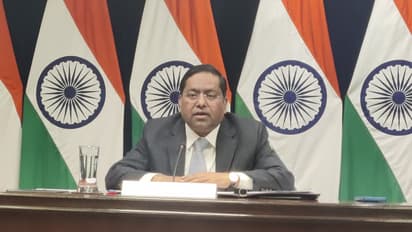India 'unequivocally' condemns airstrikes on Afghan civilians, slams Pakistan's old practice of shifting blame

Synopsis
India condemns airstrikes on Afghan civilians, criticizes Pakistan's cross-border operations, and emphasizes the importance of Afghan sovereignty in the ongoing regional tensions.
In response to media queries regarding the recent airstrikes on Afghan civilians, India’s Ministry of External Affairs (MEA) has issued a strong condemnation. Official Spokesperson Shri Randhir Jaiswal expressed concern over the loss of innocent lives, including women and children, in the strikes. He emphasized India's firm stance on the issue, reiterating that "any attack on innocent civilians is unequivocally condemned." Jaiswal pointed out that such incidents are part of an ongoing pattern where Pakistan blames its neighbours for its own internal failures.
The MEA’s statement also referenced the response of Afghan officials, who have condemned the airstrikes as a violation of Afghanistan's sovereignty.
"We have noted the media reports on airstrikes on Afghan civilians, including women and children, in which several precious lives have been lost," Jaiswal said in a statement.
"We unequivocally condemn any attack on innocent civilians. It is an old practice of Pakistan to blame its neighbours for its own internal failures. We have also noted the response of an Afghan spokesperson in this regard," the statement added.
The comments from the MEA come amid escalating tensions between Pakistan and Afghanistan. Pakistan's recent airstrikes in Afghanistan’s Barmal district, located in Paktika Province, have drawn sharp reactions from Afghan authorities.
Meanwhile, Pakistan’s Special Assistant to the Prime Minister on Political Affairs, Rana Sanaullah, has warned that Pakistan may launch more cross-border operations in Afghanistan if its security is threatened, claiming such actions are justified under international law.
“Pakistan has the legal right to continue these operations if its soil is attacked from Afghanistan,” he said.
In addition, Pakistan’s Minister for Planning, Ahsan Iqbal, expressed grave concerns about what he described as a new wave of terrorism affecting Pakistan, urging the Afghan government to curb attacks emanating from its soil. This followed a deadly blast in Pakistan’s Balochistan Province, which resulted in several casualties, further fueling the ongoing tensions.
“Pakistan has made significant sacrifices for the Afghan people and continues to bear this burden,” Iqbal said.
The Taliban, who currently control Afghanistan, have denied Pakistan’s allegations, insisting that attacks on Pakistan's security forces from Afghan soil are an internal issue for Pakistan to address. They also rejected the notion of allowing Afghan territory to be used for such operations, countering Pakistan's assertions with accusations that Islamabad has long supported Islamist militants within its own borders.
“How can Pakistan deny the same ideology within its own borders after nurturing it in its schools for years?” a Taliban official was quoted as saying.
Amid these developments, former US envoy Zalmay Khalilzad highlighted Pakistan’s internal crises, including political instability and economic challenges, suggesting that Pakistan must undertake a "reset" to address these issues.
Stay updated with the Breaking News Today and Latest News from across India and around the world. Get real-time updates, in-depth analysis, and comprehensive coverage of India News, World News, Indian Defence News, Kerala News, and Karnataka News. From politics to current affairs, follow every major story as it unfolds. Get real-time updates from IMD on major cities weather forecasts, including Rain alerts, Cyclone warnings, and temperature trends. Download the Asianet News Official App from the Android Play Store and iPhone App Store for accurate and timely news updates anytime, anywhere.